China’s Top Economic and Finance Officials
And comparisons with their BRIC counterparts
Jan. 26 – As the debate increases over the extent of potential problems – or lack of them – within the Chinese economy, in this article we take a look at the chief figures behind the structuring and implementation of China’s economic policies, their background, education and career briefs.
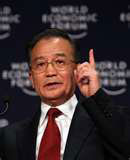 Wen Jiabao
Wen Jiabao
Premier
Born in Tianjin. Premier Wen graduated from the Beijing Institute of Geology in 1968 with a major in geological structure, and also has a postgraduate education as an engineer. Premier Wen is regarded as the leading figure behind China’s current economic policy. He previously held roles in mining and geological exploration in Gansu Province. Premier Wen’s domestic economic agenda represented a shift in policy, whereas instead of concentrating on GDP growth in large cities and rich coastal areas, he proposed a more balanced approach in developing China’s hinterland regions, and advancing policies considered more favorable towards farmers and migrant workers. Internationally, Wen played a key role in China’s response to the Global Financial Crisis and subsequent stimulus program. Premier Wen is expected to retire in March 2012.
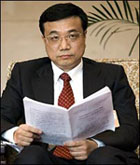 Li Keqiang
Li Keqiang
Vice premier
Born in Anhui Province. Vice-Premier Li is a 1974 graduate of the School of Economics of Peking University. He would be the first premier of China to have previously been an economist. He also holds a doctorate in economics as a post-grad qualification. He has previously held senior official roles in Henan Province and Liaoning Province, and currently serves as Premier Wen Jiabao’s top lieutenant. Li’s current official portfolio includes development, price controls, finance, climate change, and macroeconomic management. His experience is mainly with centralized economic planning, while his education occurred at the height of Marxist economic theories during the Cultural Revolution. Li has recently held meetings in Spain with the Spanish Finance Minister over assistance with Spain’s own economic problems, including deals to continue purchases of Spanish sovereign debt.
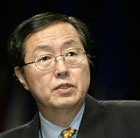 Zhou Xiaochuan
Zhou Xiaochuan
Governor, People’s Bank of China
Born in Jiangsu Province. Zhou is the head of China’s Central Bank, and has held this position since 2002. He graduated from Beijing Institute of Chemical Technology (now Beijing University of Chemical Technology) in 1975 and received a PhD in economic systems engineering from Tsinghua University in 1985. Zhou is married to Li Ling who runs the Treaty and Laws Department of China’s Ministry of Commerce, which has played a central role in handling China’s trade disputes with the United States under the World Trade Organization. Forbes has referred to Zhou and Li as a “Chinese power couple that the Obama administration has to watch out for in the coming years as the United States tries to defend its position in the world economic pecking order.” As the leading banking authority, Zhou is in charge of clearing-up an estimated US$865 billion of bad loans in the Chinese banking system. Recently, he has also been under pressure from the finance ministers and central bankers of the G7 countries to revalue the yuan and change its exchange rate-setting mechanism. He is currently in his final term as governor of the PBOC and is considered one of the most influential economic figures in the world, being ranked fourth by Foreign Policy in the Top 100 Global Thinkers report of December 2010.
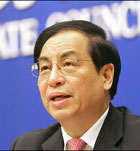 Liu Mingkang
Liu Mingkang
Head of the China Banking Regulatory Commission
Born in Fujian Province. Liu is the head of China’s banking and finance regulatory body and was previously on the board of the Peoples Bank of China. He is a graduate of the Peking University School of Economics and holds an MBA from the City University of London (1987). According to the Times Higher Education analysis of Higher Education Funding Council for England RAE data, from 159 universities and colleges in the United Kingdom, the City University of London ranked 59th in 2010. Liu’s position is to regulate the Chinese economy and banks. Liu stated on the CBRC web site earlier this month that “China’s banks face arduous challenges this year as international and domestic economic situations remain very complicated.” He is expected to retire later this year.
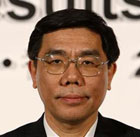 Jiang Jianqing
Jiang Jianqing
President, Industrial and Commercial Bank of China
Born in Shanghai. Jiang graduated from Shanghai University of Finance and Economics in 1984, and later obtained his master’s and doctor’s degrees from Shanghai Jiao Tong University. His scope of work includes theoretical and practical bank innovation, and corporation theory of both industrial and financial capital. He has pioneered the use of online banking in China and has also been instrumental in financing much of China’s expansion into markets in Africa. He is expected to replace Liu Mingkang as the head of the CBRC.
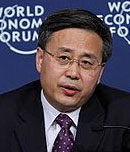 Guo Shuqing
Guo Shuqing
Chairman, China Construction Bank
Born in Inner Mongolia. Guo graduated with a degree in economics from Nankai University – known for its academic research capabilities. He previously served as vice-governor of the People’s Bank of China and vice-governor of Guizhou Province as well as the director of the State Administration of Foreign Exchange. China Construction Bank is the world’s second largest by capitalization.
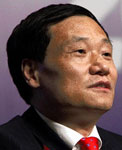 Xiao Gang
Xiao Gang
Chairman, Bank of China
Born in Jiangxi Province. Xiao graduated from Hunan Institute of Finance and Economics in 1981, and obtained a Master’s degree in international economic law from Renmin University of China in 1996. Xiao has been chairman of the board of the Bank of China since August 2004. He is also chairman of the Bank of China in Hong Kong and previously served as deputy head of the People’s Bank of China. He has recently been critical of the U.S. Federal Reserve for increasing the money supply of U.S. dollars.
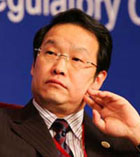 Xiang Junbo
Xiang Junbo
Chairman, Agricultural Bank of China
Born in Sichuan Province. Xiang obtained his undergraduate degree in finance from Renmin University of China, his Master of Economics from Nankai University, and PhD in Law from Peking University. Xiang was vice-president of the People’s Bank of China from 2004 to 2007 before becoming secretary of the Communist Party Committee of the Agricultural Bank of China in 2007, and its chairman in 2009.

We can compare the Chinese officials backgrounds to some extent with the highest ranking officials, finance ministers and central bankers from the other emerging BRIC economies:
Brazil
Guido Mantega
Finance minister
Graduate with a degree in economics from the University of São Paulo and now a professor of economics at the same university;
2004-2006: Chairman of BNDES (National Bank for Economic and Social Development)
2007-present: Finance minister
Alexandre Tombini
Governor, Banco Central de Brasil
PhD in economics from the University of Illinois and an undergraduate degree in economics from the Universidad de Brasília.
Previously senior advisor of the executive-director and member of the executive board, Brazilian Office, International Monetary Fund (IMF) in Washington D.C.
Senior advisor, Foreign Trade Board, Office of the Chief of Staff of the President of the Republic of Brazil
General Coordinator of International Affairs, Secretary of Economic Policy of the Brazilian Ministry of Finance.
Miriam Belchior
Minister for planning and budgets
Master’s degree in public administration and government from Fundação Getulio Vargas-SP.
Professor with the Foundation for Research and Development of Administration, Accounting and Economics (FUNDACE), linked to FEA/USP Ribeirão Preto (2001-2008)
Professor of administration, accounting and economics, University São Marcos (1999-2002).
India
Dr. Manmohan Singh
Prime minister
Graduated from Panjab University, Chandigarh, with bachelor and master degrees in economics in 1952 and 1954. He went on to read for the Economics Tripos at Cambridge University. In 1962, Singh completed his studies at the University of Oxford.
1982-1985: Governor of the Reserve Bank of India
1987-1990: Secretary General of the South Commission in Geneva from 1987 to 1990, an independent economic policy think tank, headquartered in Geneva, Switzerland.
1990-1991: Adviser to Prime Minister of India on Economic Affairs
1991-1995: Finance Minister of India
1998-2004: Leader of the Opposition in the Indian Parliament
2004-present: Prime Minister of India
Pranab Mukherjee
Finance minister
Graduated from Calcutta University with focus on political science and law.
2006-2009: Foreign minister
2009 – present: Finance minister
Duvvuri Subbarao
Governor, Reserve Bank of India
Graduate of Indian Institute of Technology with a degree in physics
Masters degree in economics from Ohio State University
PhD in economics from Andhra University
1988-1993: Department of Economic Affairs
1993-1998: Finance secretary
1998-2004: Lead economist, World Bank
2005-2007: Economic Advisory Council, Prime Minister’s Office
2007-present: Governor, Reserve Bank of India
Russia
Dmitry Medvedev
President
Graduate, law department, Leningrad State University (1987), and obtained Candidate of Sciences degree in private law from the same university.
1991-1996: Legal expert, international relations, Mayor of St. Petersburg’s office
1996-2005: Various commercial positions in business
2005-2007: Deputy prime minister
2008-present: President, has made economic reform a top agenda policy.
Vladimir Putin
Prime minister
Graduate, International Law branch of the Law Department of the Leningrad State University (1975)
1975-1991: Officer within KGB
1992-1997: Various positions with St. Petersburg Mayor’s office
1998-1999: President’s office
2000-2008: President of Russia
Alexei Kudrin
Finance minister
Graduated with a degree in economics from Leningrad State University
PhD in economics from the Institute of Economics at the Academy of Sciences of the Soviet Union.
1990-1996: Vice chairman, Committee for Economic Reform, St. Petersburg Mayor’s office
1997-2000: Deputy finance minister
2000-present: Finance minister
Sergey Mikhaylovich Ignatyev
Chairman, Central Bank of Russian Federation
Graduate and PhD in economics from Leningrad State University
1996-1997: Economic advisor to the president
1997-2002: Deputy finance minister
2003 – present: Chairman, central bank
In terms of educational background, it is apparent that while China’s top economists and bankers have a diverse background, not all of them have held specific commercial positions within China’s financial or economic industries, and have tended to gain experience through Communist Party driven exposure to state planning. Additionally, of them, only the current banking regulator, Liu Mingkang, holds any qualifications from overseas universities. However, that can also be compared with Russia, where all of the top financial and economic reform-led positions are held by graduates of the same University! In contrast, both Brazilian and Indian officials have more experience in international universities and institutions in addition to exposure in the international commercial arena, something both Chinese and Russian officials tend to lack. This may impact upon certain inabilities to additional reform within the global financial community as the onus for both Chinese and Russian officials may tend towards the control and management of domestic markets as opposed to further liberalization and global integration.
This has in fact already manifested itself through differences in the management of currencies. While both India and Brazil employ a managed float for their currencies, China and Russia have pegged their currencies within specific exchange rates, resulting in a policy of both countries taking a view on the rate or direction of the ruble or RMB in relation to other currencies. In contrast, both the Indian and Brazilian central banks maintain more liberal policies of currency stabilization rather than specific manipulation, and it could therefore be argued that such policies come from the experiencing of a wider academic background than both China and Russia have tended to involve their senior leaders in.
Related Reading
China’s Dragon Playing with Fire
 BRIC Nations Report (complimentary download)
BRIC Nations Report (complimentary download)
The emerging economies of Brazil, Russia, India and China, or so-called BRIC bloc of countries, represent 40 percent of the world’s population and together, a growing economic force.
Our daily foreign investment, legal, tax and Indian operational business news web site
Our daily foreign investment, legal, tax and Russian operational business news web site
- Previous Article China Clarifies Business Tax Exemption For Offshore Outsourcing
- Next Article China Failing to Cool off GDP Growth as Some Cities Plan for 30% Increases










